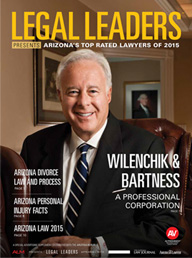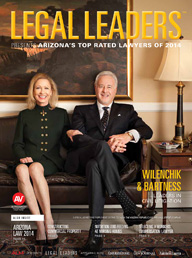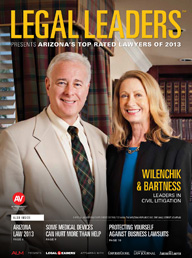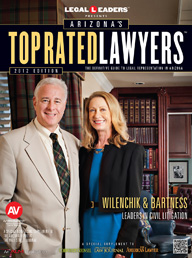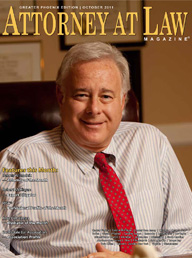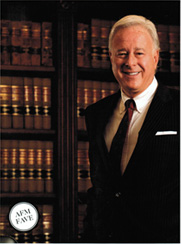9-19-12 Grant Woods on Dennis and Jack Wilenchik's "Legal-ease"
Former Arizona Attorney General Grant Woods comes on the show to talk about the race for President and what it's like to be a Goldwater Republican in today's Republican Party.
An Example of How Mediation Works
First, no mediation is identical to another: participants varyin their interests and/or level of sophistication, and counsel may or may notbe present—the variables are endless. With the foregoing caveat in mind, Ioffer the following example of a voluntary mediation in which I served as themediator. No names are used and all identifying references have been deleted toprotect the confidentiality of the process.The initiating party was a local bank that wanted to submita problematic loan workout with a developer to mediation. Neither party hadfiled an action against the other yet, and the bank hoped the matter could besettled without the need for litigation. The Bank explained that the participantshad reached an impasse over the issue of whether default fees and interestaccrued to date be included in the payoff amount, at which point all offers byboth participants were withdrawn. (As an aside, I wondered if something morewas going on, because waiver of late fees and penalty interest is usually oneof the first claims lenders let go of in work-out negotiations.)Both participants agreed to mediate the issues. Neitherwould be represented by counsel.As a result of pre-mediation interviews with theparticipants and review of the participants’ pre-mediation statements, Ilearned that the parties had agreed to the major terms of the workout,(modified interest rate, extended payment plan, personal guarantee ofborrower’s principal for difference between current appraisal and loan amount,re-issuance of extended coverage lender’s title insurance), but that at thelast minute the bank had raised and stood firm on the issue of default interestand fees. Each participant accused the other of bargaining in bad faith, butwas still willing to give it one last try. Their willingness to mediateindicated to me that there was stillhope for a agreement.The participants arrived on time the day of the mediation.The parties and I had agreed previously to set aside four hours for themediation.As soon as the participants were seated, I got an inkling ofwhat the problem might be. The borrower, an LLC, was represented by themanaging member, (who was the guarantor under the previously proposed settlement).He was tanned and wore a large gold Rolex, golf shirt, golf pants, and loafers.He fit the stereotype of the rich developer to a tee. The bank representativewas the bank’s senior vice president in charge of real estate lending. He wasdressed in a business suit. Both men appeared personable, but avoided eyecontact with each other.Based on a hunch, after the mediator’s opening, I asked the partiesto each tell, in turn, what brought them to the mediation, and also to tell alittle about their personal history—where they were from, where they’d gone toschool, how they came to be in their present occupations. I asked each how thedownturn in the economy had affected their business and personal lives.I hoped the expanded personal information would help undoany stereo-typing and misperceptions.As a clarifying question, the bank representative spoke ofthe stress caused by cost cutting and layoffs and the change of focus from dealmaking to risk control. The developer representative identified with the stressof cost cutting and layoffs, and additionally mentioned the pressure of tryingto maintain a positive, successful image to attract investors so he could stayin business. The bank’s representative agreed, and said sometimes he feltschizophrenic having to bring in business while controlling risk and limitinglosses at the same time.The participants were more relaxed after thesedisclosures, and eventually reached an agreement. The mediation lasted a littleover two hours.
9-12-12 Florence Mining Debate
Wilenchik & Bartness, on Behalf of the Rutherford Institute, Files Habeas Corpus Petition in Federal District Court for Phoenix Man Jailed for Home Bible Studies
Wilenchik and Bartness attorney Jack Wilenchik, who is an affiliate attorney of the Rutherford Institute, a pro bono civil rights group, filed the petition in August on behalf of Michael Salman to obtain his release from custody. Mr. Wilenchik also appeared on behalf of Pastor Salman at a disposition hearing in City court in July, after a judge had previously found Pastor Salman "guilty" of violating probation by having services with more than 12 people at his home before going to jail. The City originally planned to ask for an additional six months of jail time, but after Mr. Wilenchik intervened with the City prosecutor, the City asked the court for only an additional couple of months, and after argument the Judge only ordered an additional ten days of home detention. For more information, seehttps://www.rutherford.org/publications_resources/on_the_front_lines/rutherford_institute_files_habeas_corpus_petition_in_federal_district_courtFor more information on the case in general:https://www.rutherford.org/key_cases/key_cases_michael_salman/
Firm Prevails in Motion to Preclude
Wilenchik & Bartness attorneys Dennis Wilenchik and Brian Schmidt prevailed on a Motion to Preclude an Expert on the basis of failure to comply with "good faith" requirement to supplement alleged defects pursuant to A.R.S. 12-1363(I).
Firm Secures Settlement for Client in High-Value Dispute
Wilenchik & Bartness attorneys Dennis Wilenchik and William Fisher represented a client in a high-value dispute with a national corporation over a securities purchase agreement in California state court, one of several related disputes. Following the final pre-trial conference in a related case, and after challenging jurisdiction over the firm's client, Wilenchik and Bartness secured a settlement for its client as part of a global settlement which dismissed all related matters.
Firm Wins Motion for Summary Judgment
Wilenchik & Bartness attorneys Dennis Wilenchik, Lawrence Felder, and Andy Anderson obtained summary judgment in favor of a client who was the defendant in a civil suit. The Court ruled that the plaintiff had failed to present any evidence that was not speculation or based on personal knowledge, and therefore that there was no genuine issue of material fact precluding summary judgment in the client's favor. Click here to see the Court's ruling.
Wilenchik & Bartness Wins Pro Bono Jury Trial against State of Arizona
Attorney Jack Wilenchik of Wilenchik & Bartness defended the Sussex family in a three-day jury trial, pro bono. The State Land Department sought $494,379 in damages from the Sussex family for trespassing on land that their family has continuously occupied since 1892, when their great-grandfather bought it from another settler. Mr. Wilenchik became involved in the case after a Maricopa County judge ruled in 2010 that the State has been the owner of the land since 1912, and that the family therefore has to pay at least nominal damages for common law trespass. After a three-day jury trial that cost the State tens of thousands of dollars, the jury refused to award $494,379 and gave the State only $1,500, or the cost of a permit to cross the land. Mr. Wilenchik says that at least two jurors still wanted to give the State nothing.Mr. Wilenchik says that the family was unable to afford a lawyer, so he agreed to handle the case pro bono. He says that during its deliberations, the jury essentially asked the judge whether they had to award any damages at all. The judge then instructed them to award at least “nominal” damages, and so the jury awarded the State only $1,500.According to the Sussex family, they and their ancestors have openly occupied the land at 302 West First Street, Tempe since 1892, when their great-grandfather Jesus Martinez purchased it from another settler. Steven Sussex, age 72, says that he grew up on the property, and that both his father and grandmother were born and died there. According to court documents, the State claims that under the Enabling Act of 1910 the land was granted to the future State of Arizona as part of 10 million acres of state land, but Mr. Wilenchik says that happened without the family’s knowledge, and the State did not file a claim for trespass or quiet title until 2005, when it filed this case. He says that the evidence at trial showed that the State had known of the Sussex’s occupancy and use since at least the 1930’s, when their great-grandmother actually leased part of the land from the State.Mr. Wilenchik says that the property contains the only road to an adobe home that belonged to the family’s great-grandfather and was built in the 1880’s. He reports that the adobe home is on the national historic registry and is one of only three historic adobe buildings left standing in the City of Tempe, which is one of the oldest cities in Arizona. According to Steven Sussex, Carl Hayden, the State’s first Congressional Representative and one of the longest-serving U.S. Congressmen in history, raised hogs on the property with Mr. Sussex’s Uncle, and during the Great Depression the Sussex family allowed homeless travelers on the adjacent railroad to stay in shacks on the property (one of which still remains). Mr. Wilenchik says that former U.S. Representative and Mayor of Tempe Harry Mitchell went to elementary school with Mr. Sussex, and that the two used to eat dinner at the adobe home when they were children. Mr. Wilenchik says that Mr. Mitchell attended the trial in support of Mr. Sussex.According to court documents, the State also sued the Sussex family for willful trespass and triple damages (under A.R.S. §§37-501, 502), but Mr. Wilenchik says that the Judge dismissed those claims as unsupported by the evidence halfway through trial.Mr. Wilenchik says that Steve Sussex served in the Navy for many years and is a veteran of the Vietnam War, before it was even called the Vietnam War. He says that Mr. Sussex is a house painter by trade, and that as a young man he painted the Hayden Flour Mill, a historic downtown Tempe landmark.See also:Arizona Republic: http://www.azcentral.com/community/tempe/articles/20120809tempe-family-loses-year-claim-land.htmlTempe, AZ August 16, 2012Contact: Jack Wilenchik, (602) 606-2810Maricopa County Superior Court case CV2005-006521
9-5-12 Attorney General Tom Horne on Dennis and Jack Wilenchik's "Legal-ease"
Fresh from being "Governor for the week," Arizona Attorney General Tom Horne stops by the studio to talk about the good work that the Attorney General's Office has been doing, combating consumer fraud and fending off lawsuits by the Obama administration.









